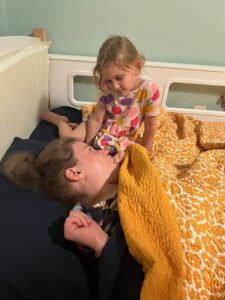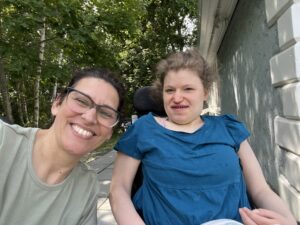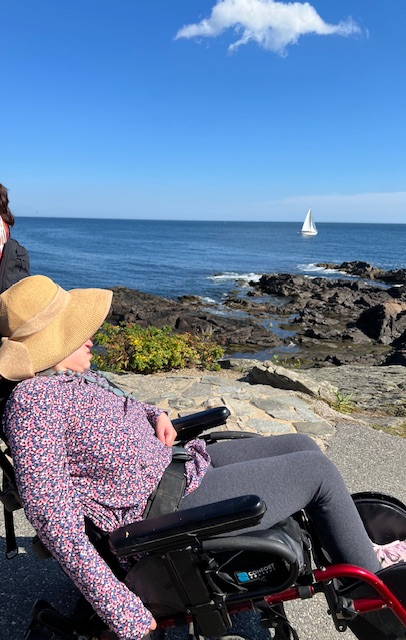It had been many years, 23 to be exact, since the last time I navigated life with a toddler. While friends of mine have started celebrating their entrance into grandparenthood, I had a remarkable occurrence of a surprise pregnancy instead. At age 45, while already the mother to a 22-year-old daughter with medical complexity and developmental needs, I was told the shocking news that I would be the parent to a daughter once again. Advanced maternal age hurdles were cleared, some more tenuous than others, but lo and behold, in the winter of 2021, a newborn arrived. Those first two years with our daughter Nika were filled with daily pinch me moments. We marveled at the mere existence of this new person developing before us. Highchairs, car seats, onesies and child rearing technological offerings, unheard of in the late 1990s, all took hold within our home. Milestones were easily met. We were on absolute cloud nine.
Then, toddlerhood entered. The temper tantrums, safety concerns and juggling of a very mobile little one coupled with the noticeable decline of her older sister became a heavier weight to carry. In this newest journey with toddlerhood, I started to wonder if my age (now 50) or perhaps the cumulative effects of decades of diaper changes, now for two individuals instead of just one, had created mental exhaustion.
I started to rescind from social interactions due to overwhelm. Most notable was my inability to clearly answer the question; how can I help? when offered by supportive friends. I understood their generosity and genuine desire to be of assistance, but I could not identify my own needs. My internal dialogue went something like this – Do I need someone to tend to the house or tend to my older daughter with special needs? Would it help my mental state if I found purpose by going back to work? Should my toddler attend preschool full-time while I remain home to catch my breath? Maybe I could simply “do better” at streamlining life and its collective tasks. In this past year, the most common thought I find myself thinking in response to outside offers of help is, “stop making my life harder”.
Small minor things like my husband asking if I know where his shoes are, my toddler insisting on Mommy doing something over anyone else, administrative bottle necks when trying to get a mere prescription refilled, are all examples of times when mental overwhelm takes hold. This wasn’t always the case. It’s only during this past year I’ve noticed this shift within my normal state of homeostasis.
This phenomenon self-propelled; it is now the case that when well-meaning friends suggest the planning of a girls’ outing, when I place unrealistic expectations on myself to see extended family members, or even just grabbing a quick dinner out with my husband ALL compound daily stressors. Each time one of these opportunities arises, I feel the quiet constraint of a belt being cinched, hoping to reach that next hole – wanting to please others, wanting to find balance, wanting to lead a normal adult life. Meanwhile, I feel a house of cards crashing down from all the tasks waiting in the wings.
Recently, I decided to investigate what research exists on the tolls taxed upon caregivers of adult children with special needs. I postulate that these consecutive 27 years, totaling more than half of my own lifespan, are the root cause of my mental decline. It’s not so much that the individual tasks of caring for Sasha, who suffers from the neurologically degenerative Sanfilippo Syndrome, are my undoing, but rather the collective and ongoing nature of those tasks.
needs. I postulate that these consecutive 27 years, totaling more than half of my own lifespan, are the root cause of my mental decline. It’s not so much that the individual tasks of caring for Sasha, who suffers from the neurologically degenerative Sanfilippo Syndrome, are my undoing, but rather the collective and ongoing nature of those tasks.
Indeed, a useful study conducted by the Polibienestar Research Institute, Universitat de Valencia and Biomedical Data Science Lab – ITACA Institute, Universitat Politecnica de Valencia, found that “the aging of family caregivers has been correlated with decreasing caregiving efficiency”. Perhaps my initial read was accurate. While my commitment to caregiving itself has never waned, my engagement with all things peripheral from it certainly has.
A little more digging had me also reading a National Institute of Health study illuminating Carol Ryff’s 6 domains for consideration towards psychological wellbeing: (1) Self-Acceptance, (2) Positive Relations with Others, (3) Autonomy, (4) Environmental Mastery, (5) Purpose in Life, and (6) Personal Growth. Immediately, many of these categories lit up my brain like a PET scan and caused me to reflect on the evolution of my life.
Sasha, who for so many years ran wild, laughed with mischief, fed herself and loved riding in the car, windows open, music blaring, is now so deeply changed. Today, Sasha is wheelchair bound, trembling while eating, crying out in the night longing for assistance to be repositioned. She needs diapering at the most inconvenient times, which is every instance that we’re headed out our front door on time, or in a public setting with a precarious wheelchair bathroom. As her eating and drinking rates have significantly slowed and require more of my time, the list of administrative and household to-do’s sits idly waiting. Her care has taxed my autonomy, my environmental mastery, my self-acceptance and my purpose in life. She has changed my trajectory. This reality is undeniable.
Sasha’s changes serve as a reminder that what was once helpful to me – like offers from others to help – may no longer be as useful. I live in a suspended state knowing that what would be most useful to me now is something that will never return: a mobile Sasha – a robust, strong, speed eating, agile Sasha. Setting that aside, even when I can identify resources to bolster control over my new environmental landscape – those which might provide greater autonomy or tap into my purpose and aid with self-acceptance – I find myself unable to act. My continual state of overwhelm has made it difficult to determine a beneficial resource.
At one point in time finding someone to help with housework or securing a care provider with a flexible schedule were the most meaningful forms of assistance. Blogging and journaling aided in reflection and self-acceptance and rippled into enhanced positive relations with others. Working outside the home provided purpose in life and personal growth. But in this current iteration of life, those tasks simply mean more oversight, which means more areas for me to manage.
In recent years, I have also identified that a quiet house provides the biggest boost in bandwidth. When Sasha’s school years came to an end, so did a quiet home. While we are very fortunate to have nursing staff come into the home to care for Sasha, Sasha and her sister (along with an additional individual) are now almost always home and a quiet house nowhere to be seen. This suggests to me that a certain bandwidth must be present to even pursue supportive tools or resources.
How can I help? is a well-meaning inquiry. But this inquiry can often stunt a response from the caregiver who is so often in that state of overwhelm. It asks us to think of a solution when we are already drowning. Thinking about Carol Ryftt’s 6 domains, it occurred to me that those offering support should consider them as well. For example, when asking a friend who is caring for an individual with special needs to go on a girl’s weekend, it might be helpful to first ask yourself – does that friend HAVE the mastery over their environment, or the autonomy to make such a plan? Or upon deeper reflection, you might see that the caregiver is consumed with domains 5 and 6 and understand that simply going out to dinner may feel like a pulling away from precious time needed to pursue their own self-care or purpose creating activities.
Caregivers often struggle with how their lives feel dictated by their circumstances. In my case, travel, working outside of the home and the pursuit of additional higher education, all intrinsically meaningful to me, also have all been put on an indefinite hold. I greatly miss engaging in a community aligned with my outside interests and meeting a greater sense of purpose. Self-acceptance ebbs and flows most days, which naturally impacts the final domain, positive relations with others. If an individual does not feel like they are flourishing, a rippling effect into other relationships can be expected.
All this is to say, caregivers feel tremendous strain. There are many days when the provision of basic life necessities are the only realistic activities to complete. I would like to offer this suggestion to those wanting to support parents like me. Offer a tangible, finite gesture of assistance. Rather than making a broad offer – Can I bring you dinner? Clarify it – “I can bring dinner over either on Tuesday, Thursday or Sunday this week” or “I can take the girls for a Sunday drive this month so that you can quietly tackle things around the house”. These more directive offers remove the pressure felt by the caregiver to make yet another decision.
Supporting a friend or family member like me is truly a subjective task for both parties involved, the supporter and the supported. It’s important to know that the caregiver role is an ever-changing landscape. Supporting loved ones navigating this life requires some reflection and finesse by both parties. In the end, and I say this delicately, trying not to “make that person’s life harder” may be a helpful mantra to start with when you are considering how to support caregivers.
References:
Namkung, E. H., Greenberg, J. S., Mailick, M. R., & Floyd, F. J. (2018). Lifelong parenting of adults with developmental disabilities: Growth trends over 20 years in midlife and later life. American Journal on Intellectual and Developmental Disabilities, 123(3), 228–240. https://doi.org/10.1352/1944-7558-123.3.228
https://www.sciencedirect.com/science/article/abs/pii/S0277953624011031
 Joanne Huff comes to Courageous Parents Network as a long time follower and parent enthusiast of the organization. As the Mother of two girls, the oldest of whom has the rare disease MPS IIIA/Sanfilippo Syndrome, Joanne has benefited tremendously from the intimate parent interviews and candid, vulnerable story sharing throughout numerous thought provoking blog posts. As her daughter’s activities and lifestyle started to slow down with disease progression, CPN became a larger anchor in times of uncertainty and unrest. It is through this lens that Joanne hopes to share experiences and insights via the CPN blog.
Joanne Huff comes to Courageous Parents Network as a long time follower and parent enthusiast of the organization. As the Mother of two girls, the oldest of whom has the rare disease MPS IIIA/Sanfilippo Syndrome, Joanne has benefited tremendously from the intimate parent interviews and candid, vulnerable story sharing throughout numerous thought provoking blog posts. As her daughter’s activities and lifestyle started to slow down with disease progression, CPN became a larger anchor in times of uncertainty and unrest. It is through this lens that Joanne hopes to share experiences and insights via the CPN blog.
Joanne completed nursing school after her daughter’s diagnosis, receiving her Bachelors of Science in Nursing from Plymouth State University, Plymouth NH. She enjoyed community liaison work with home care providers of adults with special needs up until her own daughter’s care became increasingly more involved. In addition to serving on the Boards of New England Regional Genetics Group (NERGG) and Adaptive Sports Partners through 2024, she has found great purpose in volunteer work advocating for policy improvements and change in Washington DC with the National MPS Society. In her free time, Joanne seeks balance and refuge with yoga, hiking and performing as an ensemble Soprano vocalist with the Pemigewasset Choral Society. When not blogging for CPN, Joanne enjoys sharing offerings on her personal Blog Folding Origami for God. She resides in Bow New Hampshire with her two daughters, Sasha and Nika, her husband Mike and her yellow lab Suki.
